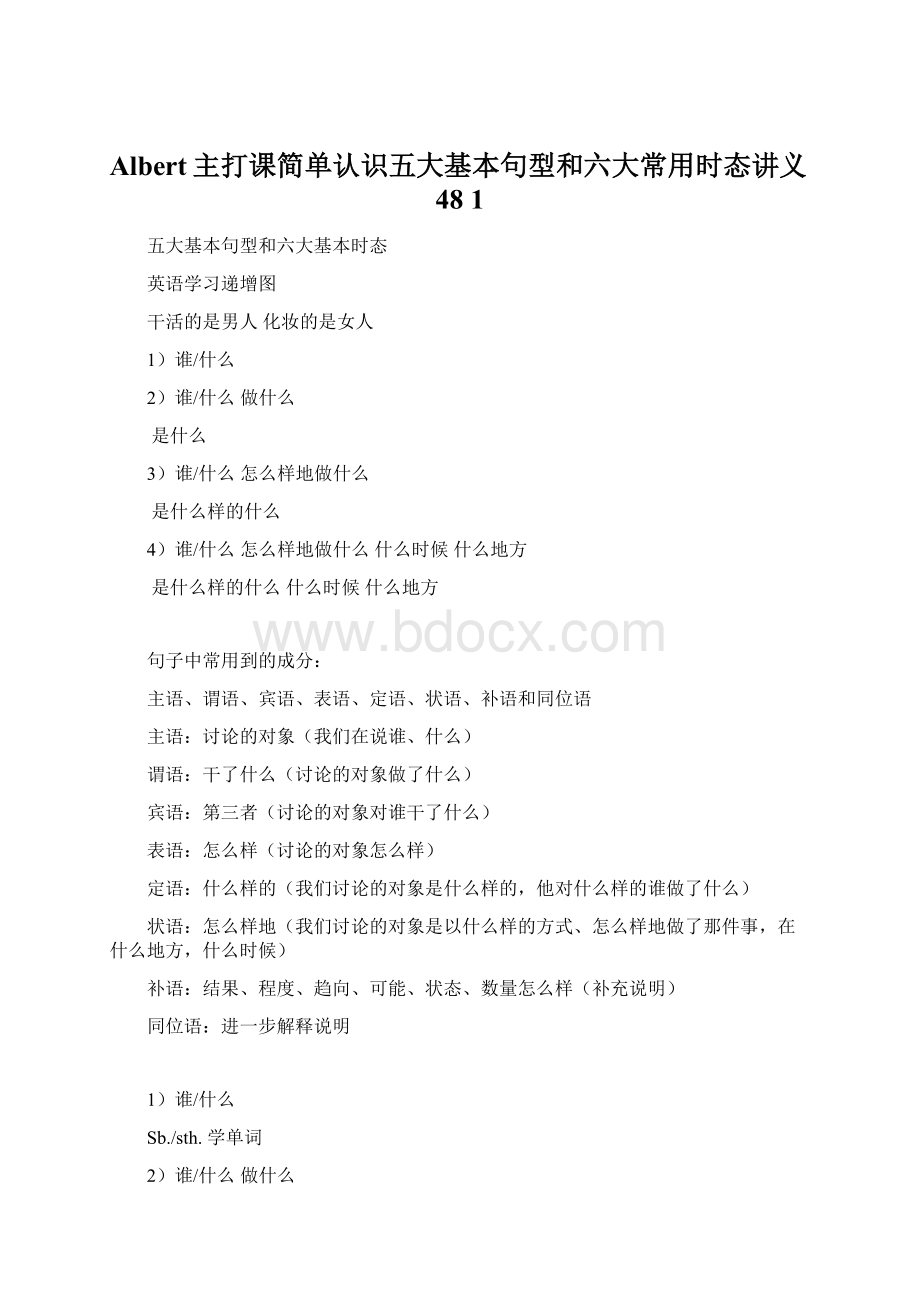Albert主打课简单认识五大基本句型和六大常用时态讲义48 1.docx
《Albert主打课简单认识五大基本句型和六大常用时态讲义48 1.docx》由会员分享,可在线阅读,更多相关《Albert主打课简单认识五大基本句型和六大常用时态讲义48 1.docx(15页珍藏版)》请在冰豆网上搜索。

Albert主打课简单认识五大基本句型和六大常用时态讲义481
五大基本句型和六大基本时态
英语学习递增图
干活的是男人化妆的是女人
1)谁/什么
2)谁/什么做什么
是什么
3)谁/什么怎么样地做什么
是什么样的什么
4)谁/什么怎么样地做什么什么时候什么地方
是什么样的什么什么时候什么地方
句子中常用到的成分:
主语、谓语、宾语、表语、定语、状语、补语和同位语
主语:
讨论的对象(我们在说谁、什么)
谓语:
干了什么(讨论的对象做了什么)
宾语:
第三者(讨论的对象对谁干了什么)
表语:
怎么样(讨论的对象怎么样)
定语:
什么样的(我们讨论的对象是什么样的,他对什么样的谁做了什么)
状语:
怎么样地(我们讨论的对象是以什么样的方式、怎么样地做了那件事,在什么地方,什么时候)
补语:
结果、程度、趋向、可能、状态、数量怎么样(补充说明)
同位语:
进一步解释说明
1)谁/什么
Sb./sth.学单词
2)谁/什么做什么
是什么
3)谁/什么怎么样地做什么
是什么样的什么
4)谁/什么怎么样地做什么什么时候什么地方
是什么样的什么什么时候什么地方
1)谁/什么
2)谁/什么做什么
是什么
Sb./sth.VXX主谓(系列)
beXX主系表(系列)
3)谁/什么怎么样地做什么
是什么样的什么
4)谁/什么怎么样地做什么什么时候什么地方
是什么样的什么什么时候什么地方
男人
Sb./sth.BeXX
主系表
Sb./sth.VXX
主谓
主谓宾
主谓宾宾
主谓宾补
Sb.VXX
Isee
主谓
Iseehim
主谓宾
Igivehimabook
主谓宾宾
Iseehimout.
主谓宾补
Sth.VXX
birdsfly
主谓
Birdscatchworms
主谓宾
motherbirdsingsasongtolittlebird.
主谓宾宾
Motherbirdcatcheswormalive.
主谓宾补
女人
Sb.sth.BeXX
主系表
Sb.BeXX
Iamfat
主系表
Sth.BeXX
Theballisbig.
主系表
衣服
一、一般现在时sb.do(v)sth.
二、一般过去时sb.did(v-ed)sth.或sb.was/were
三.一般将来时sb.will/begoingtodo(v)sth.
四.现在进行时sb.be(am/is/are)doing(v-ing).
五.现在完成时sb.have/hasdone(v-ed)sth.
六.现在完成进行时sb.have/hasbeendoing(v-ing)sth.
注:
这里的sb.代表主语,并不代表一定是人,也可能是物,比如汽车,acariscoming.一辆车正驶过来。
(现在进行时,表示动作正在发生)
过去
现在
将来
一般现在时
一般过去时
一般将来时
现在进行时
————
——————
现在完成时
————
———————
现在完成进行时------
一、一般现在时sb.dosth./sbam/is/are
表示:
通常性、规律性、习惯性的状态或者动作(有时间规律发生的事件)的一种时间状态。
结构:
sb.do(v)sth./sbam/is/are
肯定式
疑问式
否定式
否定疑问式
Iwork.
Doyouwork?
Idon'twork.
Don'tyouwork?
Youwork.
Doyouwork?
Youdon'twork.
Don'tyouwork?
Wework.
Doyouwork?
Wedon'twork.
Don'tyouwork?
Theywork.
Dotheywork?
Theydon'twork.
Don'ttheywork?
He(She,It)works.
Doeshe(she,it)work?
He(She,It)doesn'twork.
Doesn'the(sheit)work?
肯定式
疑问式
否定式
否定疑问式
Iamastudent.
areyouastudent?
Iamnotastudent.
Aren’tyouastudent?
Youareastudent.
Areyouastudent?
Youarenotastudent.
Aren’tyouastudent?
Wearestudents.
Areyoustudents?
Wearenotstudents.
Aren’tyoustudents?
Theyarestudents.
Aretheystudents?
Theyarenotstudents.
Aren’ttheystudents?
He(She,It)isastudent.
Ishe(she,it)astudent?
He(She,It)isnotastudent.
Isn’the(sheit)astudent?
动词第三人称单数变化规律
情况
构成方法
读音
例词
一般情况
加-s
清辅音后读/s/浊辅音和元音后读/z/
swim-swims;
help-helps;
like-likes
以o结尾的词
加-es
读/z/
goes,does
以s,sh,ch,x等结尾的词
加-es
读/iz/
watches
以辅音字母+y结尾的词
变y为i再加es
读/z/
study-studies
不规则变化have和be动词
变have为has变be为am,is,are
have-has
be-am,is,are
过去
现在
将来
一般现在时
一般过去时
一般将来时
现在进行时
————
——————
现在完成时
————
———————
现在完成进行时------
二、一般过去时sb.did(v-ed)sth.或sb.was/were
表示:
过去某个时间里发生的动作或状态;过去习惯性、经常性的动作、行为;过去主语所具备的能力和性格。
结构:
sb.did(v-ed)sth.或sb.was/were;否定形式①was/were+not;②在行为动词前加didn't,同时还原行为动词;一般疑问句Did+主语+do+其他。
(注:
V-ed称为动词的过去式结构,因其常用于过去时当中)
动词过去式规则变化:
1.直接加ed:
work—worked/look—looked/play—played,
2.以e结尾的单词,直接加d:
live—lived/hope—hoped/use—used,
3以辅音字母+y结尾的,变y为i加ed:
study—studied/carry—carried/worry—worried,
4以元音字母+y结尾的,直接加ed:
enjoy—enjoyed/play—played
5以重读闭音节结尾的,双写最后的辅音字母+ed:
stop—stopped/plan—planned
动词过去式不规则变化见不规则变化动词表
肯定式
疑问式
否定式
疑问否定式
Iworked
DidIwork?
Ididnotwork
Didn’tIwork?
He(she,it)worked
Didhe(she,it)work?
He(she,it)didnotwork
Didn’the(she,it)work?
Weworked
Didwework?
Wedidnotwork
Didn’twework?
Youworked
Didyouwork?
Youdidnotwork
Didn’tyouwork?
Theyworked
Didtheywork?
Theydidnotwork
Didn’ttheywork?
肯定式
疑问式
否定式
否定疑问式
Iwasastudent.
wereyouastudent?
Iwasnotastudent.
Weren’tyouastudent?
Youwereastudent.
wereyouastudent?
Youwerenotastudent.
Weren’tyouastudent?
Wewerestudents.
wereyoustudents?
Wewerenotstudents.
Weren’tyoustudents?
Theywerestudents.
weretheystudents?
Theywerenotstudents.
Weren’ttheystudents?
He(She,It)wasastudent.
Washe(she,it)astudent?
He(She,It)wasnotastudent.
Wasn’the(sheit)astudent?
【练习】
1.I_________(have)anexcitingpartylastweekend.
2._________she_________(practice)herguitaryesterday?
No,she_________.
3.What________Tom________(do)onSaturdayevening?
He________(watch)TV.
过去
现在
将来
一般现在时
一般过去时
一般将来时
现在进行时
————
——————
现在完成时
————
———————
现在完成进行时------
三.一般将来时sb.will/begoingtodo(v)sth.
表示:
将来某一时刻的动作或状态,或将来某一段时间内经常的动作或状态。
(常常和表示将来的时间状语连用。
如:
tomorrow(明天),nextweek(下周),fromnowon(从现在开始);inthefuture(将来)等。
)
结构:
sb.will/begoingtodo(v)sth.
(在BritishEnglish中也常会用到助动词shall(第一人称),will(第二、三人称)+动词原形构成。
美国英语则不管什么人称,一律用will。
)
例句:
Iwillgotovisithimnextweek.下周我将去拜访他。
I‘mgoingtogotothepark.我将要去公园。
肯定式
疑问式
否定式
疑问否定式
Iwillwork
Williwork?
IWon’twork
Won’tIwork?
He(she,it)willwork
willhe(she,it)work?
He(she,it)willnotwork
Won’the(she,it)work?
Wewillwork
Willwework?
Wewillnotwork
Won’twework?
Youwillwork
Willyouwork?
Youwillnotwork
Won’tyouwork?
Theywillwork
Willtheywork?
Theywillnotwork
Won’ttheywork?
肯定式
疑问式
否定式
疑问否定式
Iamgoingtowork
Amigoingtowork?
Iamnotgoingtowork
Ain’tIgoingtowork?
He(she,it)isgoingtowork
Ishe(she,it)goingtowork?
He(she,it)isnotgoingtowork
Isn’the(she,it)goingtowork?
Wearegoingtowork
Arewegoingtowork?
Wearenotgoingtowork
Aren’twegoingtowork?
Youaregoingtowork
Areyougoingtowork?
Youarenotgoingtowork
Aren’tyougoingtowork?
Theyaregoingtowork
Aretheygoingtowork?
Theyarenotgoingtowork
Aren’ttheygoingtowork?
肯定式
疑问式
否定式
否定疑问式
Iwillbeastudent.
willyoubeastudent?
Iwillnotbeastudent.
Won’tyoubeastudent?
Youwillbeastudent.
willyoubeastudent?
Youwillnotbeastudent.
Won’tyoubeastudent?
Wewillbestudents.
willyoubestudents?
Wewillnotbestudents.
Won’tyoubestudents?
Theywillbestudents.
willtheybestudents?
Theywillnotbestudents.
Won’ttheybestudents?
He(She,It)willbeastudent.
willhe(she,it)beastudent?
He(She,It)willnotbeastudent.
Won’the(she,it)beastudent?
【练习】
1.Todayisasunnyday.We______________(have)apicnicthisafternoon.
2.Mybrother_______________(go)toShanghainextweek.
3.Tomoften______________(go)toschoolonfoot.Buttodayisrain.He______________(go)toschoolbybike.
过去
现在
将来
一般现在时
一般过去时
一般将来时
现在进行时
————
——————
现在完成时
————
———————
现在完成进行时------
四.现在进行时sb.be(am/is/are)doing(v-ing).
表示:
动作发生的时间是“现在”,动作目前的状态是“正在进行中”。
所谓“正在进行中”,是指在谈到这件事的时候,这个动作还在进行中。
至于它是什么时候开始的,什么时候会停下来,不是我们关心的。
所以“正在进行时”的事件,可能发生几年了,也可能只有几分钟。
仍在进行中这是“正在进行时”的关键所在。
它是一件持续进行的事情。
结构:
sb.be(am/is/are)doing(v-ing).
(注:
V-ing称为动词的现在分词形式,常用于进行时当中)
动词现在分词变化形式:
1.直接+ing(例:
sleep+ingsleeping)
2.去掉不发音的e+ing(例:
bite-e+ingbiting)
3.重读闭音节,中间只有一个元音字母,且末尾只有1个辅音字母,双写辅音字母+ing(例:
sit+t+ingsitting)
4.以ie结尾变ie为y+ing(例:
die-dyinglie-lying)
5结尾为c且c读作/k/时,在结尾加k再加ing,如picnic-picnicking
例句:
Wearewaitingforyou.我们正在等你。
Mr.Greeniswritinganothernovel.格林先生正在写另外一本小说。
Theyareplayingbasketballnow.现在他们正在打篮球。
肯定式
疑问式
否定式
疑问否定式
Iamworking
Amiworking?
Iamnotworking
Ain’tIworking?
He(she,it)isworking
Ishe(she,it)working?
He(she,it)isnotworking
Isn’the(she,it)working?
Weareworking
Areweworking?
Wearenotworking
Aren’tweworking?
Youareworking
Areyouworking?
Youarenotworking
Aren’tyouworking?
Theyareworking
Aretheyworking?
Theyarenotworking
Aren’ttheyworking?
1.LiPing(learn)tospeakEnglish。
2.It(rain)now。
3.They(watch)afootballmatchonTV。
【另注:
很多单词(如:
go/come/leave/make/take等,其中go/come/leave最为常见)的现在进行时形式表示将来:
例:
I'mleavingforatrekinNepalnextweek.我下周要支去尼泊尔旅行。
】
过去
现在
将来
一般现在时
一般过去时
一般将来时
现在进行时
————
——————
现在完成时
————
———————
现在完成进行时------
五.现在完成时sb.have/hasdone(v-ed)sth.
表示:
过去发生并且已经完成的动作对现在造成影响或后果,过去某一时间开始并一直持续到现在并且有可能还会持续的动作或状态。
结构:
sb.have/hasdone(v-ed)sth.
(注:
done(v-ed)称为动词过去分词,常用于完成时态中)
1、规则动词过去分词构成:
规则动词的过去分词的构成规则与规则动词的过去式的构成规则相同。
(1)、一般动词,在词尾直接加“ed”。
work—worked—worked/visit—visited—visited
(2)、以“e”结尾的动词,只在词尾加“d”。
live—lived—lived,
(3)、以“辅音字母+y”结尾的动词,将"y"变为"i",再加“ed”。
study—studied—studied/cry—cried—cried
(4)、重读闭音节结尾,末尾只有一个辅音字母,先双写该辅音字母,再加“ed”。
stop---stopped---stopped/drop---dropped--dropped
不规则动词过去分词变化构成见不规则动词变化规则表
例句:
Ihavekeptthebookforquiteafewdays.这本书我已经借来很多天了。
Howlonghasyoursisterbeenateacher?
你sister当教师多久了?
Tomhashadacoldsincethedaybeforeyesterday.汤姆前天就开始生病了。
肯定式
疑问式
否定式
否定疑问式
Ihaveworked.
haveyouworked?
Ihaven’tworked.
haven’tyouworked?
Youhaveworked.
Haveyouworked?
Youhaven’tworked.
haven’tyouworked?
Wehaveworked.
Haveyouworked?
Wehaven’tworked.
haven’tyouworked?
Theyhaveworked.
Havetheyworked?
Theyhaven’tworked.
haven’ttheyworked?
He(She,It)hasworked.
Hashe(she,it)worked?
He(She,It)hasn’tworked.
hasn’the(sheit)worked?
【练习】
1.He(be)hereforovertwoweeks.
2.—Whenyou(start)learningEnglish?
—Well,it(be)twoyears.
—Soyou(learn)Englishfortwoyears.
3.Myuncle(go)totheU.S.in1978and(be)thereeversince.
过去
现在
将来
一般现在时
一般过去时
一般将来时
现在进行时
————
——————
现在完成时
————
———————
现在完成进行时------
六.现在完成进行时sb.have/hasbeendoing(v-ing)sth.
表示:
1.表示从过去某